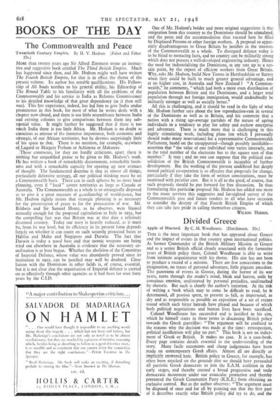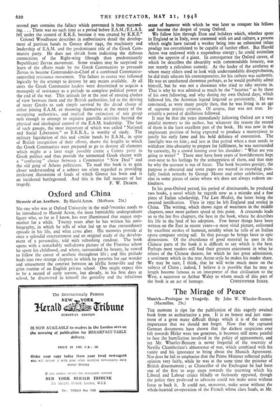Divided Greece
Apple of Discord. By C. M. Woodhouse. (Hutchinson. 21s.) Tins is the most important book that has appeared about Greece and the impact of events in that country upon international politics. As former Commander of the British Military Mission in Greece and as a senior British official closely associated with the formative years of British policy there, Colonel Woodhouse is able to write from intimate acquaintance with his theme. His aim has not been to produce a record of a mission. There are few concessions to the imagination, no traces of personal adventure, little piquant anecdote. The panorama of events in Greece, during the horror of its war years, turns through the reader's mind, bleak and barren, unlit by conscious emotion, undistorted by personal prejudice, undisturbed by rhetoric. But such is clearly the author's intention. At the risk of writing a hook which may to some be difficult to read, he is determined, all passion spent, to present as full, as impersonal, as dry and as responsible as possible an exposition of a set of events round which such bitter hatreds have played and because of which both political negotiations and human lives have been sacrificed.
Colonel Woodhouse has succeeded and is justified in his aim, which he himself states in these terms in discussing British policy towards the Greek guerrillas : " The argument will be confined to the reasons why the decision was made at the time : retrospection, political justification will play no part." This book is not an indict- ment of Greek or British. It makes no case. It is a case-book. Every page contains details essential to the understanding of the story. Many facile statements and cheap judgements have been made on contemporary Greek affairs. Almost all are directly or implicitly answered here. British policy in Greece, for example, has often been attacked on the grounds that we should have persuaded all patriotic Greek democrats to join the E.A.M. coalition in the 'early stages, and thereby created a broad progression and truly democratic movement under our avuncular protection and thereby prevented the Greek Communist Party (K.K.E.) from obtaining an exclusive control. But as the author observes : " The argument must be disposed of once and for all by pointing out that the first part of it describes exactly what British policy did try to do, and the
second part contains the fallacy which prevented it from succeed- ing.. .. There was no such time as a period before EA.M./E.L.A.S. fell under the control of K.K.E. because it was created by K.K.E." Colonel Woodhouse describes in authoritative detail the develop- ment of partisan bands in Greece after 1941, the machinery and leadership of E.A.M. and the predominant role of the Greek Com- munist party. He does not shrink from indicating the dubious connections of the Right-wing (though then predominantly Republican) Zervas movement. Some readers may be surprised to learn of the efforts made by the Greek Communists to persuade Zervas to become Commander-in-Chief of a combined Communist- controlled resistance movement. The failure to coerce was followed ldgically by the attempt to destroy by any means available. At all costs the Greek Communist leaders were determined to acquire a monopoly of resistance as a prelude to complete political power at the end of the war. This attitude lay at the root of ensuing clashes of view between them and the British authorities, led to the driving of many Greeks to seek simple survival by the dread choice of either joining E.A.M. or throwing themselves at the mercy of the occupying authorities, and implied the extinction of any group rash enough to attempt to organise guerrilla activities beyond the physical and ideological control of the E.A.M. leadership. The fate of such groups, the most important of which was called "National and Social Liberation " or E.K.K.A., is worthy of study. The Military liquidation of this and similar bands by E.A.M., in spite of British recognition of their efforts, shows the lengths to which the Greek Communists were prepared to go to destroy all elements which might at a later stage possibly create a Centre party in Greek politics and thus provide the tormented Greek elector with a " confusing " choice between a Communist " New Deal " and the old gang of Athens politicians. To read this book is to gain closer understanding of a subject too often regarded as providing irrelevant illustration of feuds of which Greece has been and is an incidental battleground. And this is the full measure of her



































 Previous page
Previous page